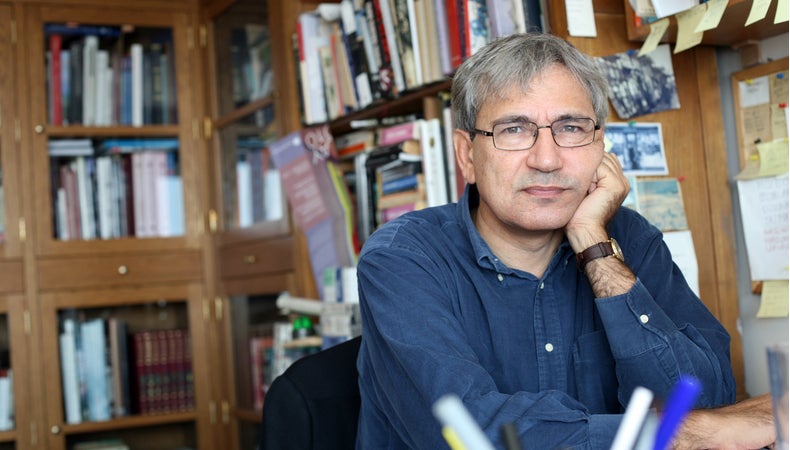For the Turkish regime, among the pages of Pamuk’s latest novel, “The nights of the plague,” there would be outrages against Mustafa Kemal Ataturk, the founder of the Turkish Republic. Over eighteen arrests of Kurdish politicians and trade unionists on terrorism charges.
The Turkish regime of Sultan Recep Tayyip Erdogan deals another blow to democracy and freedom of expression by imprisoning intellectuals and political opponents. The nightmare of legal actions returns to undermine the Turkish Nobel Orhan Pamuk. This time, not for his press statements, such as those on the 1915 Armenians’ massacre that cost him various lawsuits, but the words written in a fictional novel set during the last years about the Ottoman Empire on an imaginary island where an epidemic has spread.
Among the pages of the writer’s latest novel, “The nights of the plague,” there would be outrages against Mustafa Kemal Ataturk, the founder of the Turkish Republic. That is the thesis accepted by the Smyrna public prosecutor who today opened an investigation – after an initial process ended in a “non-place to proceed” – starting with the charge of the lawyer Tarcan Uluk for which the alleged offense on the founding father of Turkey would constitute a “hate speech.”
In his testimony before the prosecutor, Orhan Pamuk denied the allegations, stressing he had written nothing regarding Ataturk, adding that there is no disrespect towards the fathers of the homeland otherwise in his book described as libertarian models. However, despite the great fame of Pamuk in Turkey, the news did not find an extensive place in the Turkish news and social media, and only a few voices were raised in support of the author, including that of the musician Fazil Say, who described the process as “ignoble, ignorant and vulgar.”
Pamuk is one of the best-known Turkish writers internationally. His career was studded with enormous success – he was the first Turkish citizen to receive the Nobel Prize in 2006 and tainted by prosecution and attacks. In 2005 went to trial for “insulting the Turkish Republic” after an interview with a Swiss newspaper. He expressed sorrow for the Armenians and Kurds killed in the transition period from the Ottoman Empire to the Republic. On the way to the courtroom, the attendance was struck by the eggs thrown by a group of nationalists blaming him for being a “traitor to the homeland.” Pamuk recently recalled with pain the vital review from “secular circles” against his support in 2010 for a referendum to limit the power of the military, promoted by Sultan Erdogan. The latter, according to the writer, would have helped to take Turkey into the European Union.
Due to his progressive and democratic attitudes, nationalists and the Muslim Brothers following the Turkish president often attacked Pamuk. Yet, at the same time, the writer has never hesitated to challenge Erdogan. For example, when the Turkish leader converted it into a Hagia Sophia mosque in 2020, the Nobel prize insisted that Turkey was no longer secular. “There is no more freedom of thought, separation of powers, or independence of the judiciary,” the Nobel laureate said this year, openly contesting the arrests of many journalists and fellow writers who ended up in prison for political views critical of President Erdogan.
But that is not all. Eighteen arrests of Kurdish politicians and trade unionists have been arrested in Turkey on charges of terrorism. Law enforcement officers stopped suspects in operations at dawn in Smyrna, on the Aegean coast, Antalya, in the country’s south, and Mardin and Diyarbakir, important cities in the south-east with a Kurdish majority of the country.
According to the Anadolu news agency, the arrested are accused of having tried to set up city cells of the PKK, the Kurdish armed party, considered terrorist by Turkey, the US, and the EU, which since the 1980s has been involved in a conflict with the Ankara army which caused over 40 thousand deaths. The suspects arrested are all members of Kurdish civil society and members of trade unions or political parties. Six of them are officials of the HDP, a pro-Kurdish opposition group and the third most represented party in the Ankara parliament.
Last Friday, the HDP sent its defense to the Constitutional Court against the request for closure of the party presented by the public prosecutor’s office in March for alleged links with the PKK. Hundreds of HDP militants, officials, and MPs have in the past been arrested or tried on similar charges. In addition, the charismatic former leader of the party, Selahattin Demirtas, has been in prison for more than five years. Various accusations hang against him, including propaganda in favor of terrorism.


